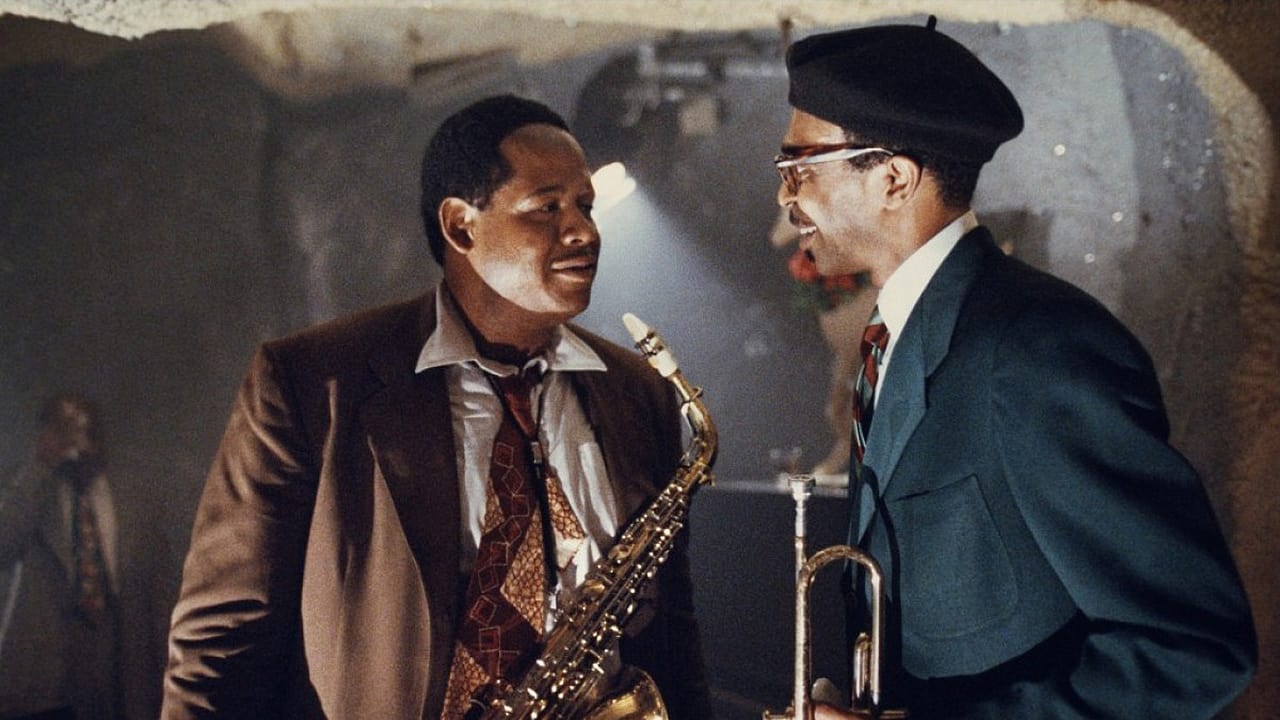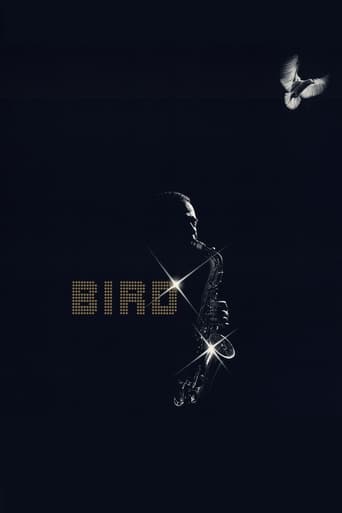



Stylish but barely mediocre overall
Ok... Let's be honest. It cannot be the best movie but is quite enjoyable. The movie has the potential to develop a great plot for future movies
View MoreOne of the best movies of the year! Incredible from the beginning to the end.
View MoreThe story, direction, characters, and writing/dialogue is akin to taking a tranquilizer shot to the neck, but everything else was so well done.
View MoreAs an actor, Clint has his limits. His best moments come with scowls. But as a director, once he passed through his orang-utan stage, he took a lot of chances -- I suppose because he was now in a position to indulge his own artistic impulses.I mean, here is this story about a dead black musician. Not a funny and friendly and famously popular type like Satchmo Armstrong, but a radical alto saxophonist who was one of the sires of bebop jazz. Bebop didn't only give the public melodies it could whistle or romantic ballads. The emphasis was all on the performers and their improvisations, usually up tempo. You had to be a technician to finger your ax that fast and a near-genius to dream up so many variations. The themes themselves were almost disposable. The titles were whimsical throwaways -- "Anthropology"? It's not "The Glenn Miller Story." On top of that, we have a frequently wrecked black junkie mating with a beautiful white woman -- Forest Whitaker and Diane Venora, respectively.Charlie Parker's wicked saxophone solos aside, it's a dark movie in almost every respect. Most movies of geniuses run along a familiar geometric narrative. Man (or woman) discovers hidden talent. Rises from obscurity to fame. Is brought down by inner demons. Recovers at the last moment through epiphany. Up, down, then up again. Bird's struggle with drugs and booze was a lifetime affair. His career had more ups and downs than a traveling block on an oil rig. As far as his recordings go, he seemed to play his instrument just as well when he was high as when he wasn't. He played just as well when they forced strings and an oboe on him.It's dark, too, because all the scenes are barely lighted. You can't see the faces too clearly. It ends tragically, too, as Charlie Parker's life did. And it's a squalid death. We don't see him sitting in a drunk ward like Kirk Douglas in "Young Man With a Horn" (read Bix Beiderbecke), his eyes suddenly widening, his face brightening, as he listens to a siren scream in the background and he says, "That's it -- that's the NOTE!" Somebody ought to do Parker's friend and colleague, Dizzy Gillespie, who passed through bebop into his own technical firmament. At least he played skillfully throughout his life, died peacefully, and had an extraordinarily subtle sense of humor. If he were elected president, he'd have changed the White House into the Blue House.If you haven't seen this and if you have some doubt about whether you want to listen to this kind of music, you might go to YouTube and find one of his three-minute recordings, preferably one with Dizzy Gillespie.
View MoreIt's been claimed that this is the Best film about Jazz ever made and whilst the glib response may be yeah, maybe, but how MANY films about Jazz have been made, the tendency is to agree. What is undeniable is the fact that director Eastwood - a well-known jazz buff - has not been content with the four-bar taste of the music then cutting away from the band to a dialogue scene approach which is what fans usually get fobbed off with, here we actually are allowed to savour (assuming, of course, the music is our prime reason for watching the film) not only the genius of Parker but also the music scene as it existed roughly between 1945-55 and though he isn't named aficionados will know it was Jo Jones who threw the cymbal at Parker to register disgust. 52nd St - known as Swing Street - has also been lovingly recreated so already we have accumulated a host of positives, throw in the remarkable lead performance from Forest Whitaker and we are talking great movie.
View MoreI watched about a third of this and got so fed up I just put a Charlie Parker cd on instead. The movie looks great and the principals are good especially Forrest Whitaker but there's very little about the music and his interactions with fellow musicians and producers. That would be interesting, instead we get typical Hollywood romance/tragic romance stuff. Bird focuses almost exclusively on Parker's relationship with Chan and his drug addiction, Bird suffers because of that. It's kind of like the bebop version of Titanic. Eastwood is a good sometimes great (Mystic River,White Hunter Black Heart ) director but often he seems entrenched in Hollywoodisms, sort of Ron Howard on steroids.
View MoreI feel as though the film did not do justice to the musically phenomenal life "Bird" went through. He was one of the most influential Jazz musicians crating an entire style of music. Which i felt was not portrayed fully. As one of the comments i've heard before stated "it seemed they had a choice between Charlie Parker as a musical genius or Charlie Parker as a junkie and they chose junkie."I felt as though the musicians playing the bird solo's did a bad job reflecting his "sound." As in Charlie Parker had a sound that filled up an entire room with complicated be-bop phrasings and with a blues background. While the musicians just had him playing fast notes most of the time which was sometimes difficult to hear over back ground noise, very "unbird like".However i did enjoy moments of the film, that showed even Charlie Parker had to play some weird gigs.My last point is that it felt as though Chan Parker was portrayed as a stable part of bird's life, and was one of the central idea's of the film. As in the love story between him and his wife, with a love hate relationship. Which i think could have been less focused on and centralized more around Charlie Parkers music.i do understand that Chan actually helped the script writer to write the film so it may have been a somewhat biased perspective.
View More